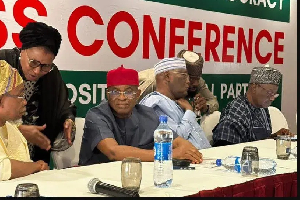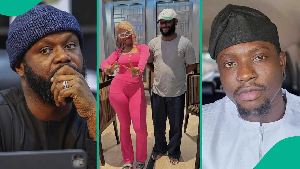Former President of the Nigeria Football Federation Amaju Pinnick has said that the Super Eagles’ failure to qualify for the 2026 World Cup was partly because of the revised qualification format.
He noted that the team would have qualified if the 2018 qualification structure remained in place.
He made the remarks on Monday at the Big Sport Dialogue in Ikoyi, where he faced pointed questions from the National President of the Authentic Nigeria Football and Allied Sports Supporters Club, Abayomi Ogunjimi.
The exchange began when Ogunjimi asked how Pinnick had used his influence as the former first Vice President of CAF and a member of the FIFA Council to advance Nigeria’s interests, noting that the country failed to reach the World Cup during his second tenure in 2022 and is also set to miss the next edition in 2026.
Pinnick dismissed claims that the Super Eagles’ failure to reach the 2022 World Cup reflected poorly on his leadership.
According to him, Nigeria neither lost nor won over the decisive fixtures in 2022 but suffered from a qualification structure that departed from the 2018 model.
“You said we did not qualify under me. We did not lose, and we did not win,” he said.
“If they had followed the same format they followed in 2018, where we were in the most difficult group in the history of football, with Zambia, Nigeria, Cameroon, Algeria, we had two games to spare and qualified for the World Cup.”
Pinnick pointed to several key results during his tenure as evidence of progress, recalling victories against Argentina and Poland, as well as a competitive performance against England. He also said he played a central role in negotiating the design of the current national team jersey with Nike.
“During our period, we beat Argentina. We beat Poland in Poland. We played in England, and England struggled against us,” he added.
“This jersey you are seeing today, I sat with Nike, and I told them to freestyle,” he said.
Pinnick declined to list specific interventions but said his period in office ensured Nigeria secured significant representation across CAF and FIFA committees, describing it as unprecedented.
“What I can tell you is that during my period as a member of the CAF Council, I had a minimum of twenty-five Nigerians in various committees. That was unprecedented,” he said.
He said there were matters he preferred not to disclose publicly, but maintained that those familiar with his work understood the extent of his contributions.
Pressed further on whether those positions translated into benefits for the country, Pinnick cautioned that some achievements were not for public disclosure.
“There are some things that are better left unsaid. Those who know, know.”
“Today, we have Nigerians in the FIFA ethics committee and in top positions. We have Aisha Falode in the FIFA media committee.”
“A lot of Nigerians did not get there by chance. People were there before me, but I don’t criticise.”
He said he welcomed difficult questions and emphasised that scrutiny was healthy. “I will not begrudge anybody, because if we do not ask the most difficult questions, we will not move from one point to the other,” he said.
Pinnick said he remained committed to supporting Nigeria despite the team’s setbacks and noted that his current role as vice president of the committee for the 2026 World Cup placed him in a position that was “not just critical for Africa but critical to the world”, even though Nigeria will not be present at the tournament.
He concluded by urging Nigerians to place greater emphasis on achievements rather than persistent criticism, saying that dwelling on shortcomings hindered collective progress.
“We should be emphasising only the positives. We only emphasise negatives, and it does not take us anywhere in this country,” he said.
Soccer News of Tuesday, 25 November 2025
Source: www.punchng.com













